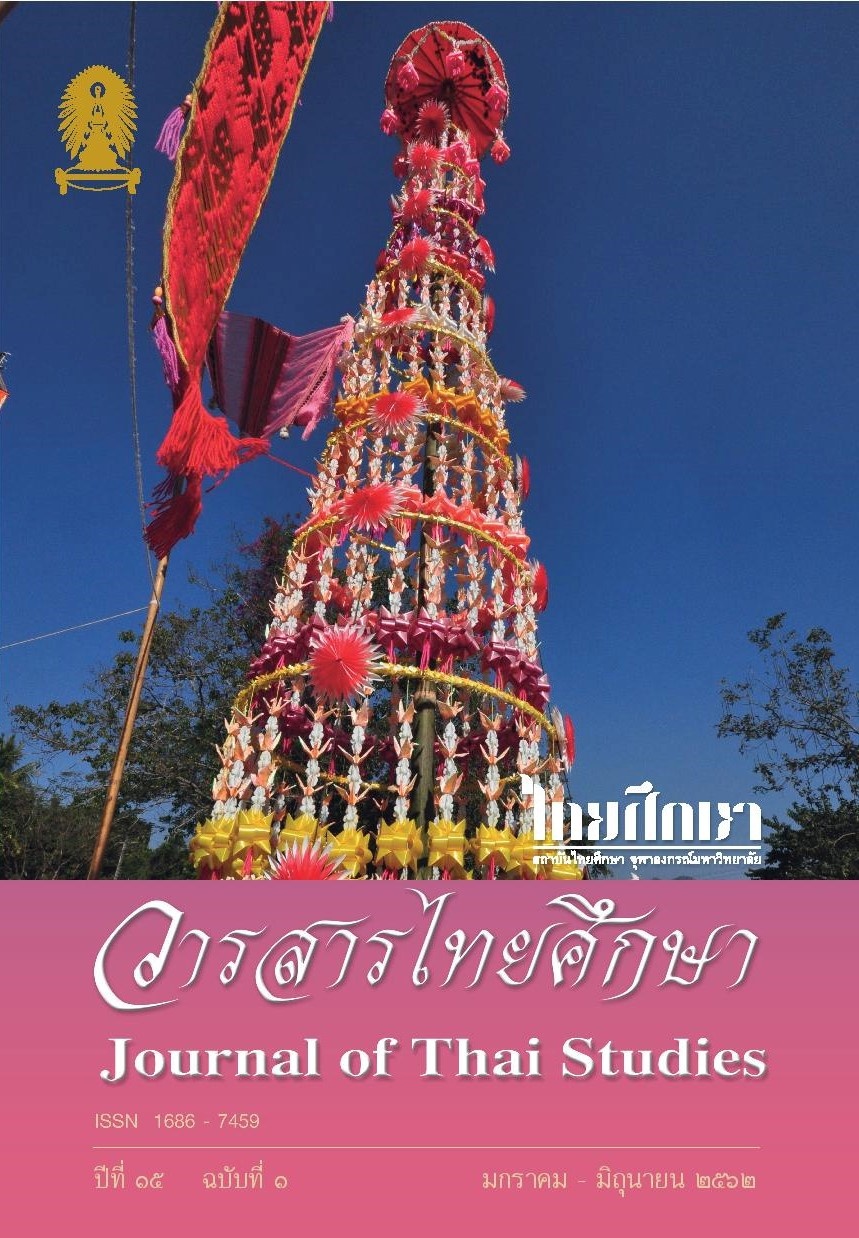Pathomsombodhi Paintings: The Function for predicting the life of Phutai Ban Khambong people, Huai Phueng District, Kalasin Province
Main Article Content
Abstract
The purpose of this article was to study the fortune-telling function of the Pathomsombodhi paintings in Prasitbochai Temple, Bankhmbong Khambong Sub-district, Huayphueng District, Kalasin Province, during the Phutai’s Vessantara chanting ceremony. The study found that the contents of the paintings were related to the stories about the Buddha in Pathomsombodhi literature. The Phuthai Khambong people have constructed a new meaning and a new function to these paintings by using them as a tool for fortune-telling. The use of the paintings of the Buddha’s stories to predict people’s life reflects the relationship among Buddhist literature, art and people’s ways of life. The Pathomsombodhi paintings affected the belief about the future life of the Phuthai Khambong people because the paintings contained the Buddha’s stories, which are believed to be highly scared. Moreover, as the ways of life of the Phuthai Khambong people are highly connected with Buddhism, the Buddha’s stories in the Pathomsombodhi paintings strongly influence the system of thinking and belief of the Phuthai Khambong people. The Buddha’s stories in the Pathomsombodhi paintings included various positive and negative stories about the Buddha. When a person picks up a number to select a painting, the story in the selected painting can be used to interpret and predict the future of that person. Thus the Pathomsombodhi paintings have taken on the function as a fortune teller, forecasting the people’s life.
Downloads
Article Details

This work is licensed under a Creative Commons Attribution-NonCommercial-NoDerivatives 4.0 International License.
Journal of Thai studies is licensed under a Creative Commons Attribution-Noncommercial-NoDerivatives4.0 Intenational (CC BY-NC-ND 4.0) licence, unless otherwise stated. Plese read our Policies page for more information on Open Access, copyright and permissions.
References
Chuajumrun, K. and others. (2010). Phu Tai Kalasin [Phu Tai in Kalasin]. Kalasin: Kalasin Kanpim.
Feungfusakul, A. (2007). Manutsayawitthaya Satsana Naeokhit Phuenthan Lae Kan Thokthiang Thang Thruesadi. [Anthropology of Religion: basic concepts and theoretical arguments]. Chiang Mai: Phongsawat.
Green, T.A. (1997). An encyclopedia of beliefs, customs, tales, music and art. California: Santa Barbara.
Laolerdworakul, A. (2003). The Thai version of Pathomsombodhikatha by the Supreme Patriarch H.R.H. Prince Paramanujitajinorasa: content relation to other biographies of the Buddha. (Doctoral dissetation). Faculty of Arts, Chulalongkorn University, Bangkok, Thailand.
Nathalang, S. (2009). Tritsadi katichonwittaya: withi nai kan wikro tumnan puenban [Folklore theory: Analysis methodology of myths and folk tales]. (2nd ed.). Bangkok: Chulalongkorn University Press.
Thitathan, S. (1990). Naewkid kiawkap sassana lae kwamchua nai sangkhom [Concepts of religions and beliefs in society]. In, Teaching materials regarding concepts of religions and beliefs in the society, unit 1-7. Nonthaburi: STOU Press.
Venerable Suthithummanuwat. (2015). Pab wichit chud pathom sompot [Exquisite paintings on the Great Enlightenment by Hem Vejakorn]. In Venerable Siriyano, T, Venerable (Eds.) published on the occasion of the
royally sponsored cremation of Venerable Dhammapanyabadi (Tissanukaro, S.). Bangkok: Cover Creative.
Yamnadda, S. (2000). Wannakadi Puttasassana pak Thai [Buddhist literature in Thai]. Bangkok: Chulalongkorn University.
Interview Source
Buchatip, C. (2017, March 18). Personal Interview.
Bunnamon, N. (2017, March 18). Personal Interview.
Charoenphon, U. (2017, March 18). Personal Interview.
Chayapinan, P.Monk, (2017, March 18). Personal Interview.
Chitchak, R. (2017, March 18). Personal Interview.
Dai sa-nguan, S. (2017, March 18). Personal Interview.
Khunthong, S. (2017, March 18). Personal Interview.
Lertsongkram, A. (2017, March 18). Personal Interview.
Pemkuen, N. (2017, March 18). Personal Interview.
Phoofaek, B. (2017, March 18). Personal Interview.
Phukedpim, N. (2017, March 18). Personal Interview.
Phupanna, N. (2017, March 18). Personal Interview.
Phuthonlert, R. (2017, March 18). Personal Interview
Prachachai, N. (2017, March 18). Personal Interview.
Prachai, M. (2017, March 18). Personal Interview.
Sriring, K. (2017, March 18). Personal Interview.
Srisa-nga, N. (2017, March 18). Personal Interview.
Sabangban, P. (2017, March 18). Personal Interview.


